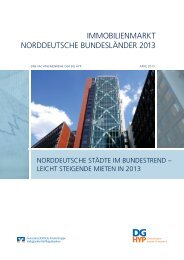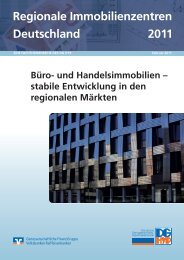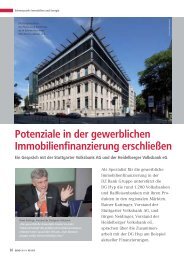Real Estate Market Germany 2009 - Deutsche Genossenschafts ...
Real Estate Market Germany 2009 - Deutsche Genossenschafts ...
Real Estate Market Germany 2009 - Deutsche Genossenschafts ...
You also want an ePaper? Increase the reach of your titles
YUMPU automatically turns print PDFs into web optimized ePapers that Google loves.
DG HYP REAL ESTATE MARKET GERMANY SEPTEMBER <strong>2009</strong><br />
attempt to halt the decline in rents. Based on the more rigid downward rent level, we expect<br />
a sharp increase in empty office space in Frankfurt – the vacancy rate is likely to reach<br />
around 16 per cent next year.<br />
Munich<br />
In contrast to Frankfurt, rents in Munich continued to rise until the third quarter of 2008,<br />
although remaining well below the Frankfurt level at just over EUR 30. Overall, rents in<br />
Munich have increased by 17.5 per cent since 1998 and thus more strongly than in<br />
Frankfurt. However, as a result of strong construction activity, the supply of space also<br />
increased significantly in this period, and the vacancy rate has thus increased more than<br />
fourfold from 2 to 9.2 per cent in the last ten years (see graph). As in Frankfurt, rents in<br />
Munich fell sharply in the first half of this year, and the rate of decline even accelerated in<br />
the second quarter. Since more new space is being completed this year and the supply of<br />
office space is growing more strongly than in Frankfurt, we expect rents to decrease by<br />
about 6 per cent this year.<br />
Vacancy rate up sharply in Munich since 1998<br />
16<br />
14<br />
12<br />
10<br />
8<br />
6<br />
4<br />
2<br />
0<br />
Frankfurt Düsseldorf Munich Berlin Hamburg Stuttgart<br />
1998 2008<br />
Source: FERI, DZ BANK Research, vacancy as % of available office space<br />
Berlin<br />
The Federal capital has the newest supply of office space as a result of the construction<br />
boom triggered by reunification. A quarter of the available 17.3m sq m has been created<br />
since 1995. This comparatively modern supply of office space also in non-central locations<br />
is clearly depressing top Berlin locations in the current downturn for office markets. Since<br />
many large companies still only have a branch in Berlin, while their headquarters is situated<br />
elsewhere in West <strong>Germany</strong>, the decision to move to a much cheaper non-central location<br />
with modern facilities is easily taken. Rents in prime locations should therefore show an<br />
above-average decline of about 8 per cent this year compared to the rest of the country.<br />
Since we expect the downward trend to continue until the middle of next year, a decline of<br />
around 3 per cent is likely in 2010.<br />
…but decline in rents likely to be<br />
weaker<br />
Munich: rents fell sharply in the first<br />
half of this year<br />
Berlin: large supply of modern office<br />
space in side locations…<br />
…therefore top rents down by 8% in<br />
<strong>2009</strong><br />
5














